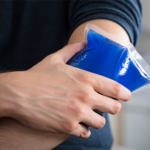For decades, Styrofoam shipping boxes y large Styrofoam shipping containers have been the backbone of temperature-sensitive logistics. Made from expanded polystyrene (EPS), these lightweight, cost-effective solutions are widely used to transport perishable goods like pharmaceuticals, mariscos, y alimentos congelados. Sin embargo, as industries prioritize sustainability and efficiency, businesses are exploring alternatives like Tempk’s thermal bags to address Styrofoam’s limitations while maintaining thermal performance.

Why Styrofoam Dominates Cold Chain Shipping
Styrofoam’s popularity stems from its unique properties:
- Aislamiento excepcional: EPS foam’s air-trapping structure delays heat transfer, keeping contents frozen or chilled for 24–72 hours.
- Absorción de impactos: Protects fragile items like lab samples or delicate produce during rough transit.
- Affordability: Lower upfront costs compared to advanced materials like vacuum-insulated panels.
- Custom Sizes: Scalable designs accommodate everything from small medical shipments to bulky seafood crates.
Challenges of Styrofoam Boxes and Containers
Despite their utility, Styrofoam raises significant concerns:
- Impacto ambiental: Non-biodegradable and rarely recycled, EPS contributes to landfill waste and microplastic pollution.
- Bulkiness: Large containers occupy excessive storage and shipping space, raising logistics costs.
- Single-Use Bias: Most Styrofoam boxes are discarded after one trip, exacerbating sustainability issues.
Industries Relying on Styrofoam Solutions
- Alimento & Beverage: Mariscos, frozen meals, lácteos, and produce.
- Cuidado de la salud: Vacunas, biológicos, and temperature-sensitive medications.
- E-Commerce: Meal kits, gourmet chocolates, and specialty goods.
- Agricultura: Flowers, plantas, and live cultures.
Tempk Thermal Bags: Sustainable, Agile Cold Chain Alternatives
While Styrofoam excels in bulk shipping, Tempk’s thermal bags provide a modern, eco-conscious solution for last-mile delivery, short-haul trips, or smaller shipments. Designed to complement or replace traditional containers, Tempk’s products bridge the gap between performance and sustainability:
Why Tempk Thermal Bags Outperform Styrofoam:
- Materiales ecológicos: Reutilizable, recyclable fabrics minimize waste versus single-use Styrofoam.
- Ligero & Compact: Save up to 50% storage space and reduce shipping costs.
- Aislamiento superior: Multi-layered foam and reflective liners maintain safe temperatures for 8–12 hours.
- Leakproof & Hygienic: Waterproof interiors prevent spills; wipe-clean surfaces ensure sanitation.
- Custom Branding: Add logos, colors, or QR codes to enhance brand visibility during deliveries.
- Cost Efficiency: Durable construction supports hundreds of uses, lowering long-term expenses.
Conclusión
Styrofoam shipping boxes and containers remain vital for large-scale, long-distance cold chain logistics. Sin embargo, businesses seeking to reduce environmental impact, optimize storage, and enhance last-mile efficiency can seamlessly integrate Tempk’s thermal bags into their operations. With advanced insulation, reusable designs, and branding flexibility, Tempk empowers companies to meet modern demands for sustainability and reliability.
Choose Tempk—Innovative Thermal Solutions for a Greener, Smarter Supply Chain.























